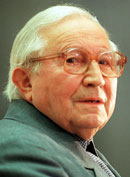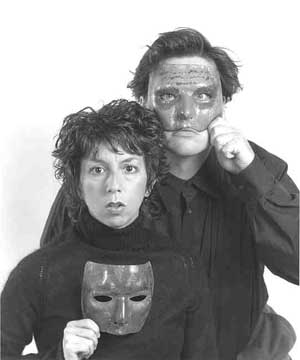
The Witnesses - Text and Sub-text
|
by Peter K. Gessner
To achieve this result, Różewicz created a play of three, at first sight, unrelated parts. These can be enjoyed at two levels, one, whose text is seemingly transparent and acceptable to the censors, the other, with a sub-text which requires some insight and reflection, but one which provides those willing to listen for the meaning between the lines, a feeling of secrets shared and a riveting intellectual experience. As the audience's riotous laughter clearly evidenced on opening night, the Irish Classical Theater's gifted actors/directors, Paul Todaro and Michelle Gigante, were able to use very effectively the playwrights comic lines. These are most evident in the first of the play's three parts, each succeeding part becoming longer that the previous one. With each, the play becomes more of a surrealist comedy provoking thought and reflection.
In 1945, the Red Army brought "liberation." But what followed was not freedom but rather an imposed Communist regime and years of Stalinist terror. Again people disappeared, some on of trains moving eastward towards Siberian Gulags, others interred Then, Stalin died and in Poland, the regime, fearful of widespread unrest, turned to Władysław Gomułka, a veteran Communist leader who, having himself been thrown in jail on trumped-up charges during the Stalinist period, had some empathy for fellow Poles and their miserable and uncertain lives. In a famous speech, he criticized past mistakes and promised economic and other reforms. And things got a bit better, though only within limits since the system remained a communist one with all its shortcomings and contradiction, both economic and in the realm of human rights. At last, however, there was to be some normalcy, life was becoming a little more comfortable. Różewicz alludes to this in the subtitle he gave to the play: Our little stabilization. The play's first part is a poem - declaimed in the Buffalo production by the two actors in a way you are not likely to have ever heard a poem declaimed before. The effect was hilarious. Already in the play's first hundred words, Różewicz remarks on the change in climate, stating: "we again have something "resembling poetry" and follows it immediately with what will become a recurring refrain: "we cross our legs" - for the first time in years, one can sit back and relax. Throughout the play and its gaiety, however darker moments surface. At times the characters suddenly, though for only briefly, develop doubts: "you know I am a bit afraid "I'm afraid I may lose "that something ... "and things will not get back to normal" In part two, one is amused by the high spirited banter of a husband and wife, yet here too a darker side intrudes - at one point the wife, looking at reality with unshielded eyes emits a cri de coeur "I can't live like this." The moment passes, the banter is resumed. Yet at the end of the second part, the husband recounts a dark, gruesome vision of his own - but the wife, engaged in her morning exercises, pays not the slightest heed. Are we all destined to own mental universes untouched by the surrounding reality? It is in the third part, the most surrealistic, that the sub-text comes into its own. Two man, friends, sit apart on an otherwise deserted terrace. As they discuss this and that, one sees in the middle distance a moving mass which is approaching. Its nature is uncertain. A body, a victim of a traffic accident, a dog, a man, a log, a seal? It's not clear. It moves closer and closer, it expires, eventually a foul smell emanates from it. It decomposes. The men on the terrace do their best to ignore it, yet it dominates their thoughts and, intermittently, their conversation. Interestingly, dramatic critics, writing at the time when the play was first produced in Poland, claimed the mass to be a human and interpreted the unwillingness of the play's protagonists to face this fact, to ascertain who it was, to extend any help, rather than just sitting as if stuck to their chairs, as evidence of a callousness caused by all they had been through. But the theater going public may have viewed the something, the mass, the stinking what-its-name as a metaphor for communism, for the regime. "What are the authorities doing? Where is public opinion," cries one of the protagonists, "It's the second half of the twentieth century ... and nobody cares." "It's a scandal," the other comments, "that no one has cleared away this carcass." Although forty years have passed and we live in a world far removed, the play's commentary continues to be relevant today. How many people view their governments as a "stinking mess" and why is no one doing anything about them? The above is adapted from a writeup of the play on the website of the Polish Arts Club of Buffalo, one of the organizations which, together with the Kosciuszko Foundation and Ingram Micro, provided financial support for the staging of the play. |
| Info-Poland a clearinghouse of information about Poland, Polish Universities, Polish Studies, etc. |

